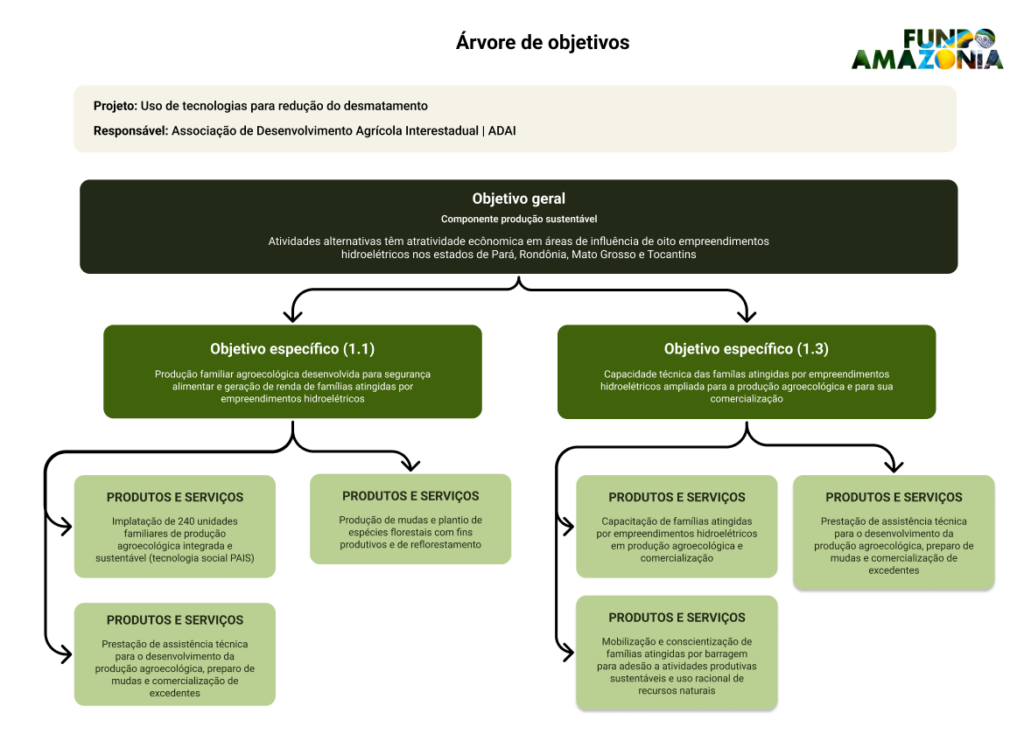

|
Project manager |
Interstate Agricultural Development Association – ADAI |
|
Territorial coverage |
Communities in areas of influence of hydroelectric projects in the states of Pará, Mato Grosso, Rondônia and Tocantins. |
|
Beneficiaries |
Riverine families and farmers in areas of influence of hydroelectric projects, who live on rural properties of less than four modules. |
|
Objective |
Implementing family agro-ecological production units, contributing to food security and income generation in an environmentally sustainable way for riverside dwellers and family farmers |
|
Total project value |
R$ 9.075.000,00 |
|
Amount of support from the Amazon Fund |
R$ 9.075.000,00 |
| Amount invested in shares from the project | R$ 9.197.935,00 |
|
Execution deadline |
42 months |
|
Project Evolution | |
|
| |
|
Date of approval |
24.05.2017 |
|
Hiring date |
31/07/2017 |
|
Total amount disbursed |
R$ 9.059.718,63 |
|
Total amount disbursed in relation to the amount of support from the Amazon Fund |
100% |
The Interstate Agricultural Development Association (ADAI) was founded in 1993 as a non-profit organization to implement projects with communities affected by dams related to hydroelectric power generation projects. To carry out this project, local units will be set up in regions where families live who have had their way of life affected by the operation, construction or planning of such projects. There are six implementation centers:
– RO: Santo Antônio HPP, Jirau HPP and Samuel HPP, involving the municipalities of Porto Velho, Candeias do Jamari, Alto Paraíso and Itapoá do Oeste.
• MT: HPP Sinop, involving the municipalities of Claudia and Sinop. • TO: HPP Estreito, involving the municipalities of Philadelphia and Babaçulândia.
– PA: Belo Monte HPP, involving the municipalities of Altamira and Brasil Novo, Vitória do Xingu and Senador José Porfírio.
– PA: Tucuruí HPP, involving the municipalities of Marabá, São João do Araguaia, Bom Jesus do Tocantins and Tucuruí
– PA: (planned development) São Luiz do Tapajós, involving the municipalities of Itaituba, Trairão and Rurópolis.
The core of the project is based on promoting agro-ecological food production, with the aim of ensuring food security for families and reducing pressure on natural resources. This will be done using the PAIS method, which stands for integrated and sustainable agroecological production. PAIS is a social technology that involves organic farming, integrated with small animal husbandry, which uses inputs produced on the property itself, preserving and promoting soil quality. It makes it possible to grow diversified and healthier food for consumption and sale, and reduces dependence on outside inputs, thus having a direct link to improving the quality of life of farming families. An additional and complementary element to PAIS is also proposed, which will consist of planting native forest species (such as Brazil nut trees and fruit trees like cupuaçu and açaí), with the aim of diversifying production on a sustainable basis and reforesting degraded areas in the project’s implementation sites. The families will be trained in seedling preparation and plantation management techniques, and will receive assistance from the technical team throughout the project.
The project plans to implement 240 PAIS, with solar-powered irrigation systems. Combined with technical training for production, the project aims to raise awareness and environmental education among the target public. It is hoped that the implementation of the project will have a disseminating effect, engendering a new dynamic in the area and mobilizing a greater number of families, beyond those who will have PAIS implemented on their properties.
The project is part of the “Sustainable Production” component of the Amazon Fund’s Logical Framework.
Tree of objectives, that is, how the project’s products and services are linked with the specific objectives and its general objectives.
